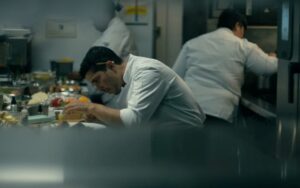HIS FATHER’S SON: 3 STARS. “a well-crafted essay on family dynamics.”
 SYNOPSIS: “His Father’s Son,” a new Canadian drama now playing in theatres, focusses on an Iranian family in Toronto thrown into conflict when a family friend, who they haven’t spoken to since they left Iran years before, leaves $1 million to youngest son Mahyar (Parham Rownaghi). “What better way to show his love for our family to leave it to our youngest,” Farhad (Gus Tayari). “It’s the symbolism. That’s how Persians are.”
SYNOPSIS: “His Father’s Son,” a new Canadian drama now playing in theatres, focusses on an Iranian family in Toronto thrown into conflict when a family friend, who they haven’t spoken to since they left Iran years before, leaves $1 million to youngest son Mahyar (Parham Rownaghi). “What better way to show his love for our family to leave it to our youngest,” Farhad (Gus Tayari). “It’s the symbolism. That’s how Persians are.”
CAST: Gus Tayari, Mitra Lohrasb, Alireza Shojaei, Parham Rownaghi, Romina D’Ugo. Directed by Meelad Moaphi.
REVIEW: A quiet family drama, “His Father’s Son” is a story of secrets and truth, but truth be told, the secret at the heart of the story isn’t that well-hidden. No spoilers here, but the big reveal is little more than a McGuffin. It’s the event that drives the narrative toward the film’s more interesting aspects, like the study of family and interpersonal dynamics and cultural representation.
Writer-director Meelad Moaphi, in his feature film debut, carefully and methodically builds tension through the conflict of the brothers, Amir (Alireza Shojaei) and Mahyar (Parham Rownaghi), and, more pointedly, between Amir, an aspiring celebrity chef who chose Italian cuisine over Persian flavors, and his more traditional father Farhad (Gus Tayari). It’s within these fractured relationships that “His Father’s Son” finds its purpose.
Key to the film’s success is the portrayal of the family. As in real life, each family member is flawed, but it is in their foibles that they emerge as real people. From the ambitious, philandering Amir’s stubborn refusal to embrace his heritage and Farhad’s generational distance from his sons to Mahyar’s naiveté, the family and their interactions feel authentic, sometimes frustratingly so. But that’s just how families sometimes are.
“His Father’s Son” is at its best when it focusses on family. When it drifts, as it does on the way to its rather sudden ending, it loses some of its well-earned momentum but nonetheless remains a well-crafted essay on family dynamics.
